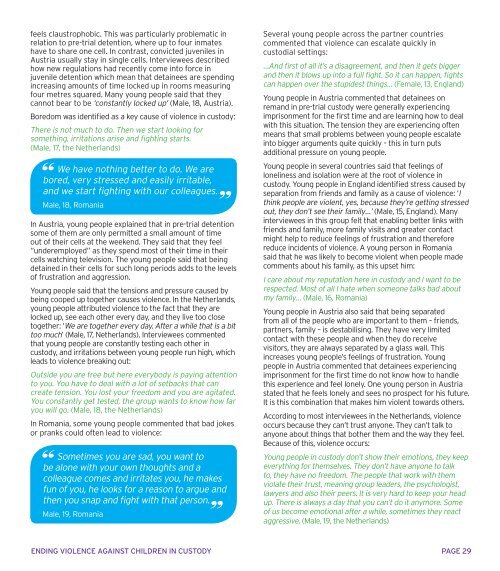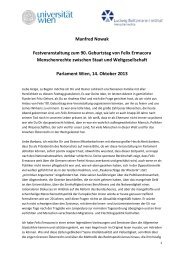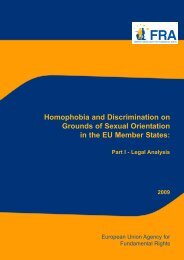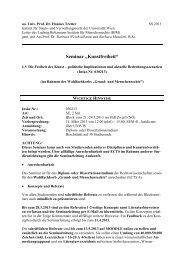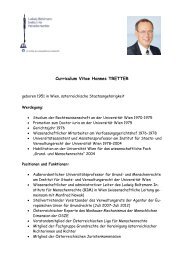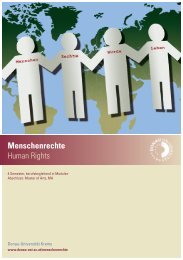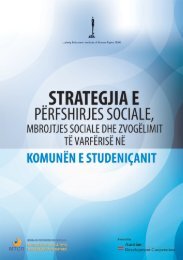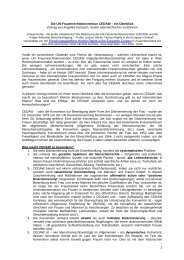speaking freely - 404 Page not found
speaking freely - 404 Page not found
speaking freely - 404 Page not found
Create successful ePaper yourself
Turn your PDF publications into a flip-book with our unique Google optimized e-Paper software.
feels claustrophobic. This was particularly problematic in<br />
relation to pre-trial detention, where up to four inmates<br />
have to share one cell. In contrast, convicted juveniles in<br />
Austria usually stay in single cells. Interviewees described<br />
how new regulations had recently come into force in<br />
juvenile detention which mean that detainees are spending<br />
increasing amounts of time locked up in rooms measuring<br />
four metres squared. Many young people said that they<br />
can<strong>not</strong> bear to be ‘constantly locked up’ (Male, 18, Austria).<br />
Boredom was identified as a key cause of violence in custody:<br />
There is <strong>not</strong> much to do. Then we start looking for<br />
something, irritations arise and fighting starts.<br />
(Male, 17, the Netherlands)<br />
We have <strong>not</strong>hing better to do. We are<br />
bored, very stressed and easily irritable,<br />
and we start fighting with our colleagues.<br />
Male, 18, Romania<br />
In Austria, young people explained that in pre-trial detention<br />
some of them are only permitted a small amount of time<br />
out of their cells at the weekend. They said that they feel<br />
“underemployed” as they spend most of their time in their<br />
cells watching television. The young people said that being<br />
detained in their cells for such long periods adds to the levels<br />
of frustration and aggression.<br />
Young people said that the tensions and pressure caused by<br />
being cooped up together causes violence. In the Netherlands,<br />
young people attributed violence to the fact that they are<br />
locked up, see each other every day, and they live too close<br />
together: ‘We are together every day. After a while that is a bit<br />
too much’ (Male, 17, Netherlands). Interviewees commented<br />
that young people are constantly testing each other in<br />
custody, and irritations between young people run high, which<br />
leads to violence breaking out:<br />
Outside you are free but here everybody is paying attention<br />
to you. You have to deal with a lot of setbacks that can<br />
create tension. You lost your freedom and you are agitated.<br />
You constantly get tested, the group wants to know how far<br />
you will go. (Male, 18, the Netherlands)<br />
In Romania, some young people commented that bad jokes<br />
or pranks could often lead to violence:<br />
Sometimes you are sad, you want to<br />
be alone with your own thoughts and a<br />
colleague comes and irritates you, he makes<br />
fun of you, he looks for a reason to argue and<br />
then you snap and fight with that person.<br />
Male, 19, Romania<br />
Several young people across the partner countries<br />
commented that violence can escalate quickly in<br />
custodial settings:<br />
…And first of all it’s a disagreement, and then it gets bigger<br />
and then it blows up into a full fight. So it can happen, fights<br />
can happen over the stupidest things… (Female, 13, England)<br />
Young people in Austria commented that detainees on<br />
remand in pre-trial custody were generally experiencing<br />
imprisonment for the first time and are learning how to deal<br />
with this situation. The tension they are experiencing often<br />
means that small problems between young people escalate<br />
into bigger arguments quite quickly – this in turn puts<br />
additional pressure on young people.<br />
Young people in several countries said that feelings of<br />
loneliness and isolation were at the root of violence in<br />
custody. Young people in England identified stress caused by<br />
separation from friends and family as a cause of violence: ‘I<br />
think people are violent, yes, because they’re getting stressed<br />
out, they don’t see their family…’ (Male, 15, England). Many<br />
interviewees in this group felt that enabling better links with<br />
friends and family, more family visits and greater contact<br />
might help to reduce feelings of frustration and therefore<br />
reduce incidents of violence. A young person in Romania<br />
said that he was likely to become violent when people made<br />
comments about his family, as this upset him:<br />
I care about my reputation here in custody and I want to be<br />
respected. Most of all I hate when someone talks bad about<br />
my family… (Male, 16, Romania)<br />
Young people in Austria also said that being separated<br />
from all of the people who are important to them – friends,<br />
partners, family – is destabilising. They have very limited<br />
contact with these people and when they do receive<br />
visitors, they are always separated by a glass wall. This<br />
increases young people’s feelings of frustration. Young<br />
people in Austria commented that detainees experiencing<br />
imprisonment for the first time do <strong>not</strong> know how to handle<br />
this experience and feel lonely. One young person in Austria<br />
stated that he feels lonely and sees no prospect for his future.<br />
It is this combination that makes him violent towards others.<br />
According to most interviewees in the Netherlands, violence<br />
occurs because they can’t trust anyone. They can’t talk to<br />
anyone about things that bother them and the way they feel.<br />
Because of this, violence occurs:<br />
Young people in custody don’t show their emotions, they keep<br />
everything for themselves. They don’t have anyone to talk<br />
to, they have no freedom. The people that work with them<br />
violate their trust, meaning group leaders, the psychologist,<br />
lawyers and also their peers. It is very hard to keep your head<br />
up. There is always a day that you can’t do it anymore. Some<br />
of us become emotional after a while, sometimes they react<br />
aggressive. (Male, 19, the Netherlands)<br />
ENDING VIOLENCE AGAINST CHILDREN IN CUSTODY PAGE 29


